Trailer
Free-to-Play Trailer
Cinematic Trailer
Gameplay
Prosperous Universe is a space economy MMO played entirely through a highly customizable user interface named APEX, which allows you to manage your own spacefaring company via web browser on any desktop computer.
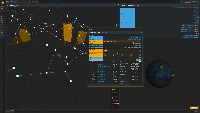
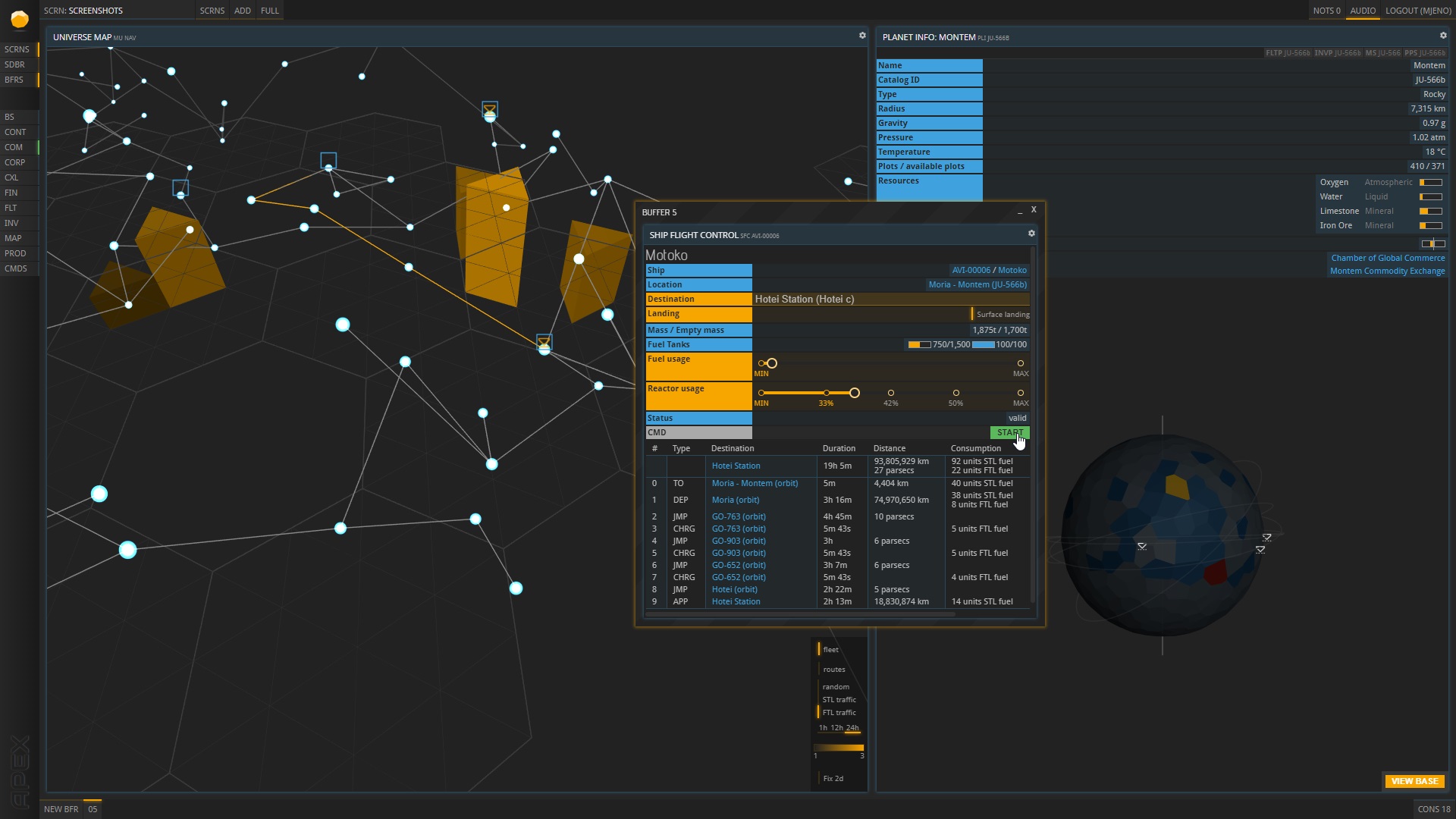
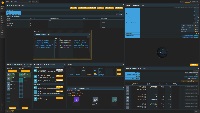
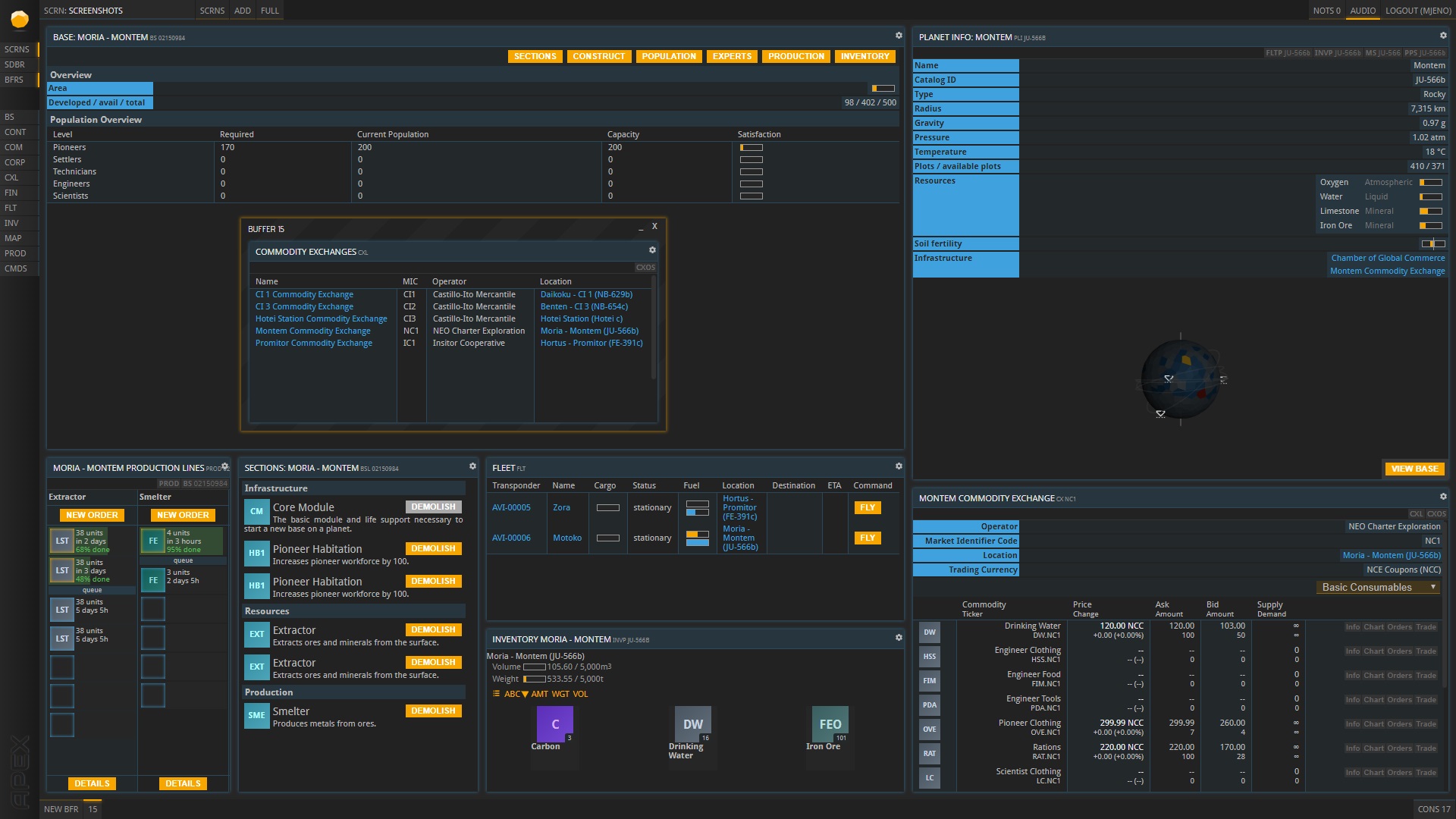
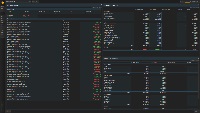
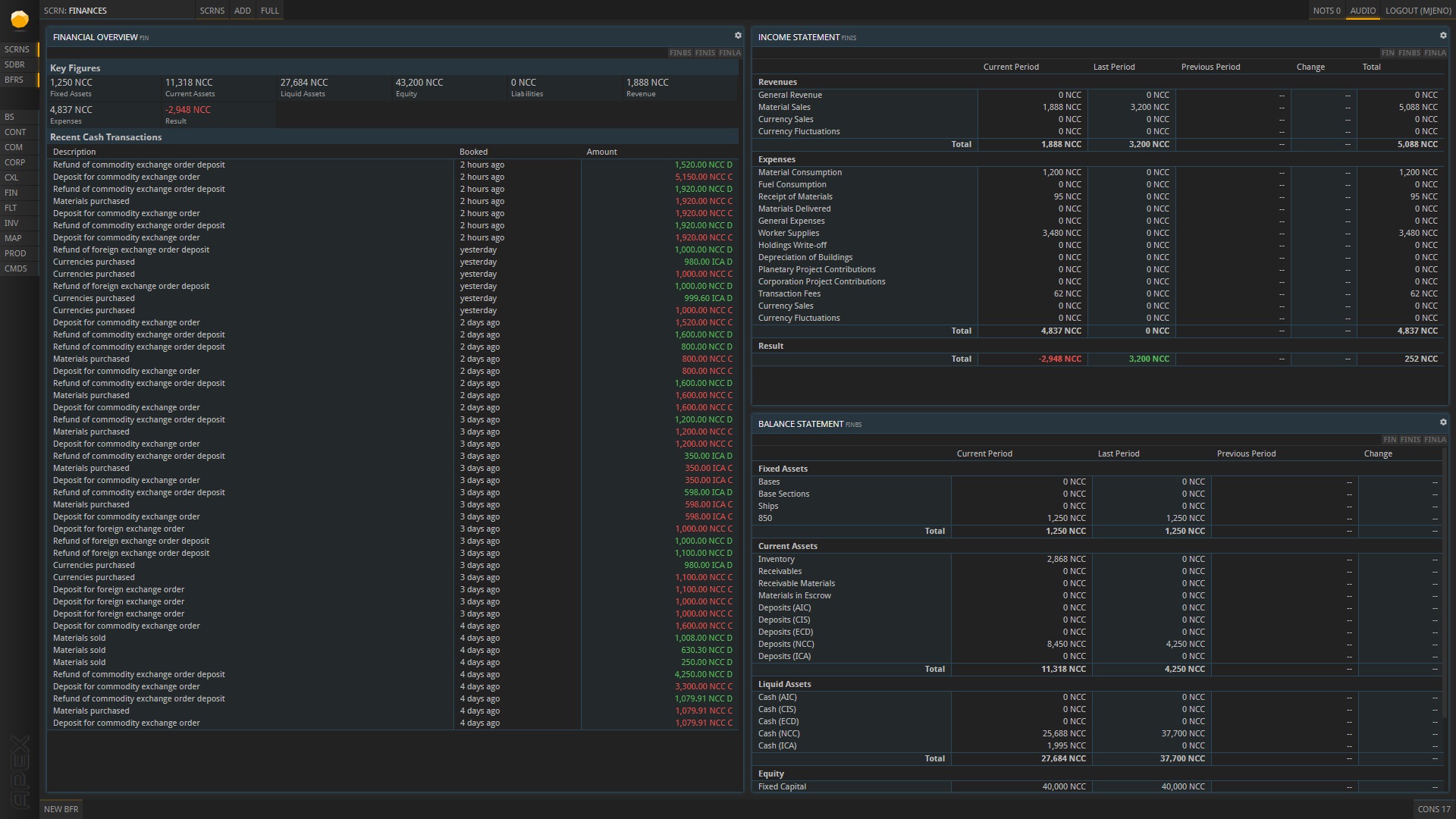
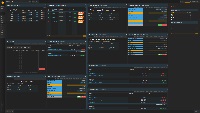
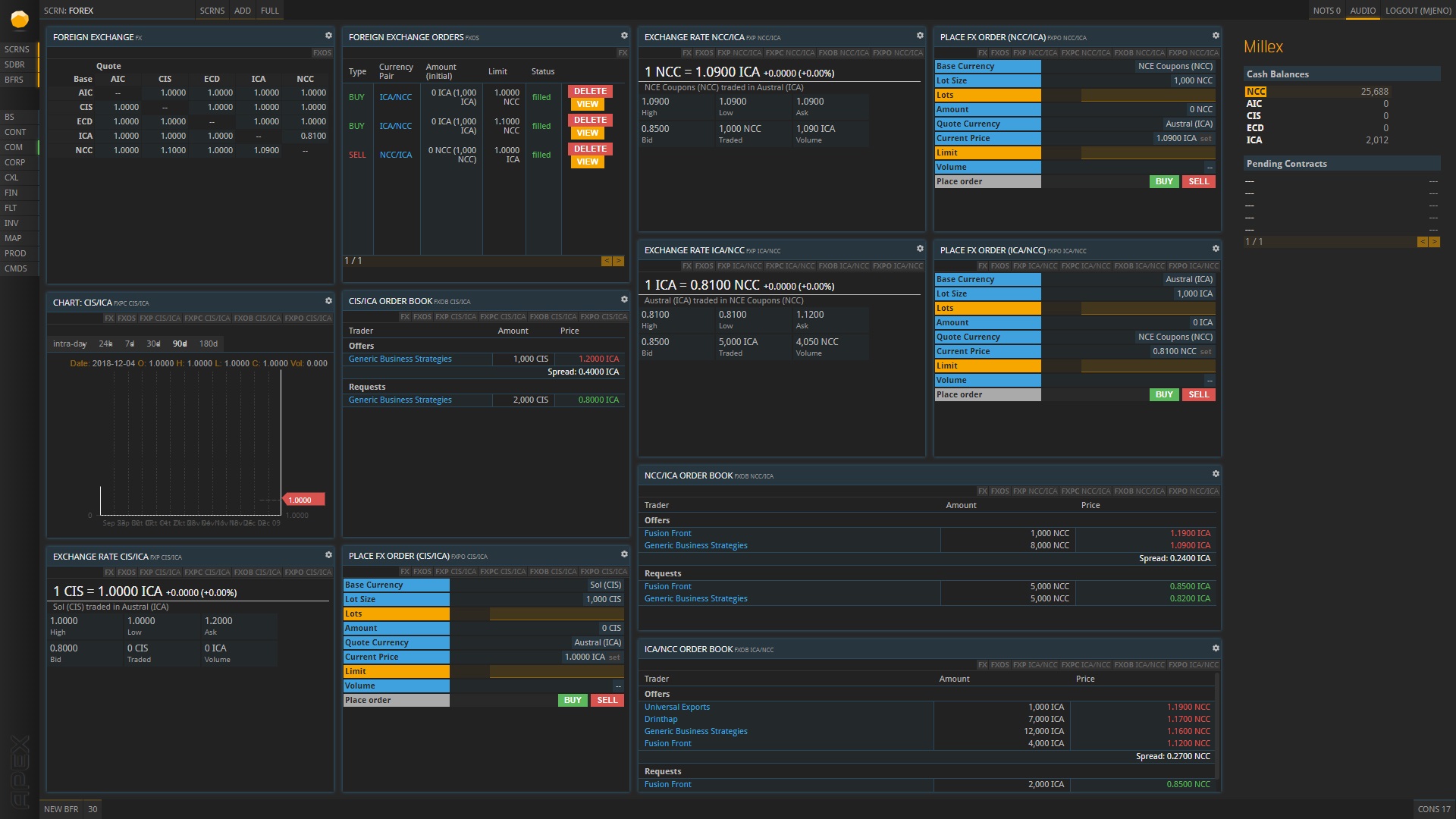
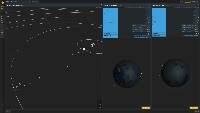
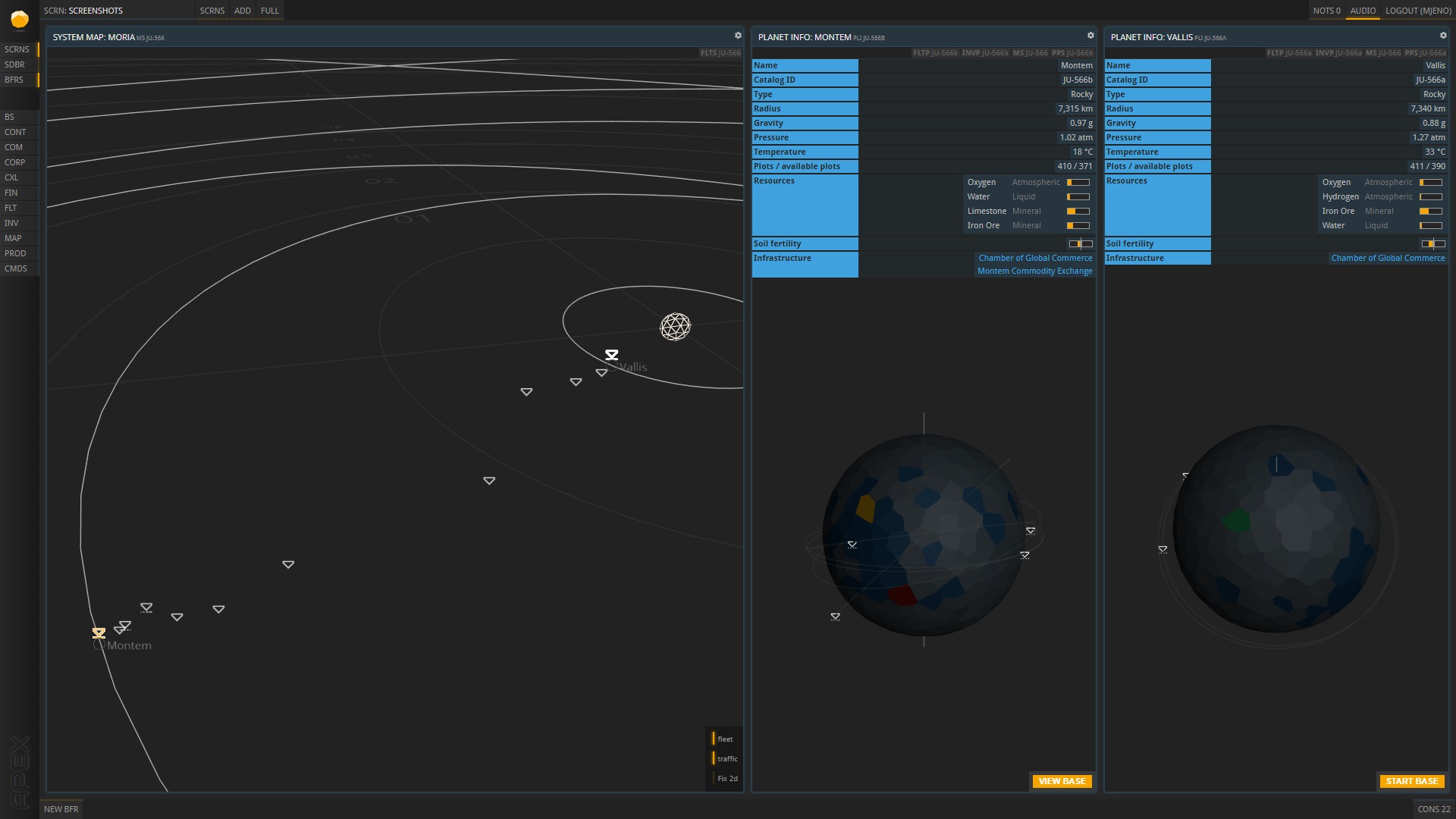
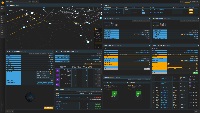

To get you accustomed with the interface, APEX has issued learning materials that gradually introduce you to its rich feature set:
This game does not set any goals for you. You decide whether you want to be the richest CEO in the system, a respected political leader, a lone hermit farming a desolate planet, or an explorer scanning the fringes of the known universe. However, everything you do happens through the lens of managing a company with the need to turn a profit.
“I don’t play browser games”
Yet you have found your way here, and for good reasons! You will find that Prosperous Universe is all but a conventional browser game. Many of our players come from hardcore PC gaming, while some others haven’t played a video game in their life. Only a few of them seem to be playing other browser games.
The browser is a very capable gaming platform, available on pretty much every computer in the world. Achieving immersion is not a matter of high-definition graphics but of a plausible and consistent way of interacting with the game world. The APEX interface provides just that.
A single, player-driven universe
All players share the same, persistent universe. As a result, every single action bears the potential to have a lasting effect on the future of the game. Rather than having NPCs and scripted events shape the course of history, economic and political developments are purely driven by players.
At the heart of our vision lies the concept of a closed economic loop. There have been thousands of browser-based sci-fi strategy games before that emphasize military conflict. By contrast, Prosperous Universe is all about the economy and complex player-driven supply chains in which every material has to be either produced or purchased from other player-run companies.
Through its many intertwined features, Prosperous Universe also allows for meaningful, high-level meta game play like forging huge alliances, building lasting empires and waging trade wars by employing diplomacy, strategy and intrigue.
Play at your own pace
A game pairing a highly realistic economy with literal rocket science appears daunting to some. And indeed, mastering complex systems is part of what gets you ahead in Prosperous Universe. However, the ability of playing the game at your own pace is engraved in its core design. Your company’s success is not directly tied to your time investment. Unlike most browser games, Prosperous Universe pulls no tricks to lure its’ players back online when they’re currently trying to go about their busy lives:
No grind. No daily “special” offers. No looming threat of destruction by the hand of others in your absence. You play when you want to play.
No pay-to-win
You decide: Play for free forever with limited features or buy a subscription to become a Premium user. Prosperous Universe will always maintain this fair and simple monetization model in lieu of pay-to-win microtransactions. Gaining a paid advantage over other players would not only unfairly favor those with deeper pockets, it would also compromise the game’s realism. For instance, long waiting times are part of space travel, and no amount of real money is going to change physics.
Pricing
The game can be played for free! However, licensees using an APEX Trial license have to deal with a few restrictions on what their companies can do. Upgrading to PRO is possible at any time by purchasing any support tier (starting at 10 €). This crowdfunding-like system allows early adopters to help fund development and get some great perks in return. Each key will grant PRO access throughout the entire First Access phase, which started in December 2018.
Once First Access is over, the PRO license will be tied to a monthly subscription fee. (Some support tiers already contain PRO months for the post-release era!). We will always do our best to steer clear of pay-to-win and in-game purchases. Thank you for supporting us!
Roadmap
Make sure to keep an eye on this page as we will update it continuously.
APEX Done
Our unique tile-based UI lets you set up and customize any number of screens to accommodate whatever workflow you prefer. For example, you could have one screen to control all mining activity in a certain system and another just to monitor the latest resource prices across various exchanges. Screens are persistent, so you’ll always find your APEX console the way you left it.
Universe Done
The world of Prosperous Universe consists of hundreds of star systems and thousands of planets. Each planet features an individual climate and resource distribution. Star types, planetary orbits as well as planet characteristics are procedurally generated based on approximations of real-world observations and models.
Base Building Done
Place a base module on a planet to start a base and expand it using different types of modules. These can include storage, habitation and production modules.
Production Done
Build specialized production modules to manufacture various materials or to exploit resources. Place production orders in queues to plan ahead.
Ships Done
Players start with a set of standard issue ships which balance cargo volume, fuel capacity and performance. Ships require fuel to operate and depending on the specs, different kinds of fuel for different types of engines.
STL Transport Done
Slower-than-light-transport in Prosperous Universe refers to travel within a star system and between planets. It’s loosely modelled after real-world orbital mechanics, so your ship’s acceleration, the total mass of your vessel (including cargo and fuel) as well as the position of planets (which changes over time) matter.
FTL Transport Done
Faster-than-light-transport allows you to travel between star systems. FTL engines work by creating a field around the ship which opens a so-called tunnel that shortens the distance between origin and destination.
Commodity Exchange Done
Almost all goods in the game can be traded on public exchanges. Brokers determine current prices by matching buy and sell orders automatically. Initial exchanges are NPC-operated and offer escrow for relatively risk-free trading.
Population Simulation Done
Operating production modules requires staff, which needs to be housed and entertained. Advanced production processes also require more advanced personnel, which in turn has more sophisticated needs. Low staff satisfaction reduces the production efficiency.
Data Maps Done
3D star maps allow you to view a wide range of stats and data from the game world, including but not limited to supply and demand within any commodity market or ship traffic through star systems.
Communication Systems Done
An embedded real-time chat systems allows players to communicate in public channels as well as private group and one-to-one conversations.
Foreign Exchange Done
Each faction in the game has its own currency. If players want to trade using a different currency from their own, they can use the central FX system to exchange currencies. Just like the commodity exchanges, this works in real-time and with automated brokers matching supply and demand.
Finances Done
A set of tools that provides a player with an overview of their assets and financial situation, including a balance sheet and an income statement.
Advanced Base Building Done
Building bases on planets of the more exotic variety requires specialized hardware to withstand harsh environments. Think floating cities in the skies of Venus...
Initial Content Done
While the majority of the game’s physical world is generated procedurally, initial systems and planets are hand-crafted.
Starting Profiles and Skill System Done
Players can choose between different profiles during sign-up, giving them advantages in the areas of the game they’d like to focus on, like trade-, mining- or production-focused setups.
Notifications Done
Since the game runs 24/7, important things can happen at any time. The notification system allows you to receive email notifications and in-game alerts about new messages, halted productions or arriving ships. Players will be able to customize their notification settings.
Advanced space flight Done
Upgraded version of both STL and FTL transport. View individual flight segments along your ship's path, send it to orbits around stars and planets, dock with space stations. View other players' ships on all maps and display their names and owners.
Space stations Done
Space stations can be found orbiting either planets or stars. While you cannot set up a base there, you are able to trade with other players.
Local Markets Done
Local markets are collectively built planetary structures allowing locals to place and accept trading offers, much like bulletin boards.
Player Rating Done
While you can enter a contract with anyone, there’s no guarantee they’ll keep up their end of the bargain. The player rating is a publicly visible rating score which is generated automatically and is based on various financial and other indicators of the respective player. This provides a clue about how reliable or trustworthy a player might be.
Production Fees and Prospecting Taxes Done
Employing personnel or just mining some minerals incurs taxes to the governing faction. Setting up bases in non-factional territories might reduce or completely avoid taxation.
Planetary Populations Done
A shared population that develops on a planet once the necessary infrastructure is available. Most likely to be used for very advanced production processes or for military purposes.
Ship Building Done
A editor allows you to design customized blueprints based on an extensible component system. Components can be structural elements, reactors, storage modules, or engines, among others. Those blueprints can be used to build ships in shipyards. This allows players to tailor ships to their specific needs.
Higher Population Levels Done
Needs for the higher population levels required for the production of more advanced modules and ship components.
Corporations In progress
Initially, these will be loose groups of players similar to clans or alliances in other games and will provide private communication features as well as collective programs that can be voted on. Later on, they will serve as the foundation for complex mid- and end-game features.
Planetary projects In progress
Collectively built structures on a planet or in its orbit granting specific benefits to its population.
Mobile Optimization In progress
Make the APEX interface usable on mobile phones and tablets.
Corporation Structures Coming soon
Allows corporations to build, operate and maintain physical structures on planets. Initially, this will be the corporation headquarters required for all subsequent corporation activities.
Dominance Coming soon
Corporations can provide the infrastructure of planets, thereby gaining control over applicable rules like fees for infrastructure services or the allocation of land.
Population Development Planned
Extension of the existing population simulation to allow growth based on satisfaction over time. This adds a more long-term component to base operations.
Energy Planned
Running a base and operating production modules requires energy. Depending on the environment of your base and the kind of production process, energy requirements might differ widely. The availability of different energy sources becomes an additional criterion when choosing base locations.
Exploration Planned
The characteristics of a planet are not visible to anyone anymore. Players have to investigate planets first to see what resources they offer and what the atmosphere looks like.
Private Exchanges Planned
Corporations can open and operate commodity exchanges of their own which allows them to control the materials to be traded, the fee structure, whether to offer escrow or not, what player rating is required to trade, and many more settings.
Infrastructure Planned
Shared planetary structures that affect all bases on a planet.
Conflict Planned
Introduces military conflict into the game, allowing corporations to conquer the infrastructure of planets. Players with bases on these planets will only be affected indirectly by changes in policy, but will never lose property.
Land Allocation Planned
While space on planet surfaces is already limited, this feature will grant more control over who can use land and under which conditions.
APEX License Trading Planned
Allows players to sell their APEX license keys to or buy them from other players.
Private Trade Future
While trading on commodity exchanges is very convenient, you might want to keep a transaction private for a variety of reasons. This system will allow you to make private deals directly with other players to achieve just that.
Flexible Contracts Future
More control over the contract system, allowing to design custom contracts, for example loans or supply contracts including delivery locations and dates.
Politics Future
A system that grants players within a faction the right to influence certain faction-wide policies through a voting system.
Tariffs Future
Whenever goods are traded across faction-borders, tariffs might be charged based on faction policy.
Asteroid Mining Future
Using specialized equipment, players can search for and exploit asteroids.
Information Trade Future
Allows players to exchange information about planets, positions of asteroids and other data for money.
Orbital Structures Future
Allows to build space stations in orbit around planets, allowing to use ships for transport that do not require the ability to land on planetary surfaces or fly within atmospheres.
Deep Space Structures Future
Similar to orbital structures, but these structures orbit around a star instead of a planet. Will most likely serve strategic purposes.
Stock Market Future
Allows companies and corporations to list on the stock exchange and players to trade in stocks and rake in dividends.
Companion Apps Future
While making the game itself mobile-friendly is not part of our roadmap for the time being, special-purpose companion apps might be a compromise to allow users to use the most common features on the go.
API Future
Provide an interface for players to develop connected apps that use PU data directly.
Steam/App Store Integration Future
Make Prosperous Universe available for purchase on commonly used platforms.
Team
Coming from very different backgrounds, the team behind Prosperous Universe shares a common passion for hard science fiction and serious business simulation games.
Core Team

Martin Simons
Martin actually holds a degree in logistics but decided early on that the shipping industry wasn't for him. There exists an undeniable passion for transport, though, leading him to create the browser-based airline management game AirlineSim in his teen years and running it to this day.
When not programming away on our server infrastructure or coming up with an AI for simulated populations, Martin takes care of all the business aspects of the project.

Michael Olp (molp)
Michael's career started out in the finance sector and had him develop software for various banks. Then he decided this wasn't fun enough and took the plunge into self-employment, creating the mobile puzzle game Blockadillo.
Anything in Prosperous Universe that's 3D and/or is moving around has probably been built by Michi.

Fabian Fischer (Counterpoint)
During his studies of computer science, Fabian decided to take a deep dive into game design and hasn't stopped ever since. Besides spending his professional life within the depths of game mechanisms and systems, he also regularly writes articles and runs a small board game company.
As game systems designer for Prosperous Universe, Fabian is primarily concerned with the rules of gameplay and how they affect the player experience.

Manoj Manduva (manumax)
Manoj discovered that his passion lies in computer graphics, design and film making early on. He then started a design studio and worked with social activists, start-ups and film makers before pursuing masters in Interaction Design. Since then, he worked with diverse teams designing software products and interfaces for automobiles. His interest in electric vehicles and space research landed him in Germany and eventually in the Prosperous Universe team.
Away from the screen he likes reading philosophy and scribbling random thoughts.

Nick Norman (NickNack)
After several years living and working in the US, Spain, and Japan, Nick moved to Germany in 2017 to pursue an MBA degree. Later he found his passion for marketing and creative strategy while working in business development.
Nick was finally able to realize his dream of working for a video game developer when he began work at simulogics in March 2020. He can be found creating content for the website, social media platforms, and ads. He is also the contact for player concerns and press relations.
Freelancers

Julian Colbus (Mjeno)
Julian started out in the games industry as a freelance composer and sound designer by the name of Mediacracy Music. He has been developing his own sci-fi game on the side since 2016.
Between 2018 and 2020 Julian was a member of the team and took care of any communications and community management matters. You might know him from our fantastic tutorial videos and he continues to support us in everything "multi-media".

Mac Rebisz
Mac has been drawing spaceships long before he even learned to read. The love for "all things space" and his creative mind lead him to a world of concept art. He has worked as a concept artist and illustrator for various video game and film companies, fulfilling his childhood dreams. Mac now works as a Senior Concept Artist at CD Projekt Red.
In his spare time, he designs space missions and spacecraft, some of them shown on his blog Space That Never Was.

Alexander Zacherl
Since 2011, Alex has founded two independent game studios and helped bring several video games come to life. As a freelance consultant on design, marketing, and management, he plays an important role in shaping the systems that make up Prosperous Universe's gameplay.
To see what else Alex is currently up, have a look at his Twitter.
FAQ
Here we try to answer the most common questions you might have about Prosperous Universe. If you can't find your question answered in the list, feel free to post it on our forums.
Where can I get the game?
Hit the button labeled "Play now!" at the top right of this page.
What is the current status of the game?
Prosperous Universe is currently in First Access. The goals of First Access are to build a community early, integrate player feedback and help fund the game's development until the full release.
What comes after First Access?
The next big steps are Early Access (2021) and ultimately the full launch (TBA). The single game world will be reset multiple times during First and Early Access and finally become persistent upon full launch.
Is Prosperous Universe a free-2-play game?
The game can be played for free! However, licensees using an APEX Trial license have to deal with a few restrictions on what their companies can do. Upgrading to PRO is possible at any time by purchasing any support tier (starting at 10 €). This crowdfunding-like system allows early adopters to help fund development and get some great perks in return. Each key will grant PRO access throughout the entire First Access phase, which started in December 2018 and will last several months. Once First Access is over, the PRO license will be tied to a monthly subscription fee. (Some support tiers already contain PRO months for the post-release era!) We have not settled on a final monthly price yet, but we expect it to be a one-digit Euro amount per month.
Why a browser-based game in 2021?
We think that the browser is a very capable gaming platform, available on pretty much every computer and every system in the world. It's the perfect match for the kind of play style we have in mind, allowing people to play from their office or while doing something else without having to download, install and run client software.
Can Prosperous Universe be played on mobile?
There is no official mobile support as of now. Our primary focus lies on desktop browsers for the time being. Optimizations to play the game on tablets as well as companion apps for certain aspects of the game are on our roadmap, though.
Will the game be available on Steam / the Apple App Store / my favorite platform?
First and foremost, Properous Universe is a browser-based game. While we do have plans to provide a client software that could be offered on platforms like Steam or the Apple App Store, this is a low priority for us right now.
My question isn't answered here, where can I ask it?
There are links to our forums and our Discord server at the top of this page. If you prefer e-mail, write to hello@prosperousuniverse.com.

